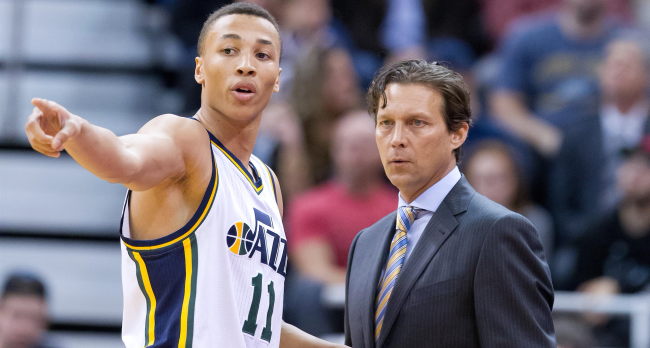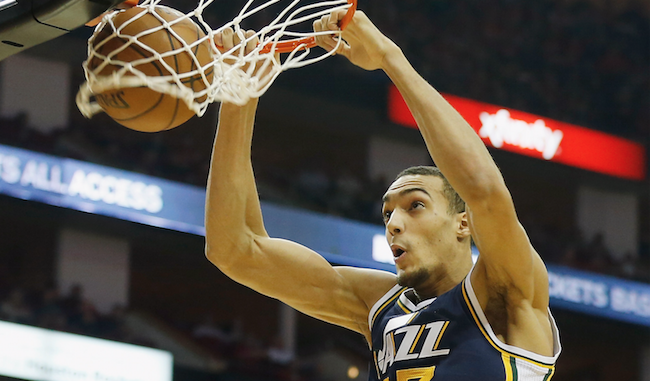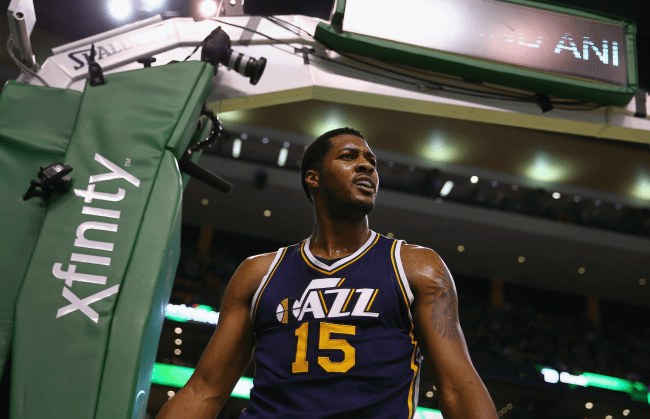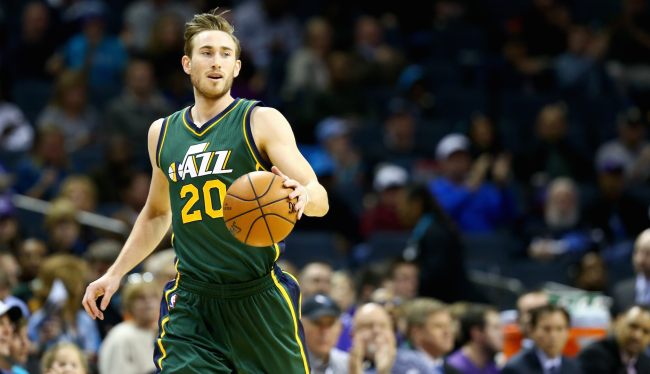
NBA players don’t perform in a vacuum. The league has always been driven by its superstars, but the game has always stayed a team sport at its core, too. That was true during showtime of the 1980s, knockdown drag-outs of the ensuing 15 years, and remains the case – perhaps to an even greater extent – during the current era of movement, space, and all-around versatility.
Long-armed forwards and wings immediately come to mind for most when thinking of “position-less” basketball. The Miami Heat coined that term by surrounding LeBron James with fleet-footed players who could defend multiple spots, score from unconventional areas of the floor, and generally leverage his wholly unique ability to its full extent. The Golden State Warriors took that idea and literally ran with it in 2014-15, fully realizing their immense small-ball potential on the game’s biggest stage last June en route to a Larry O’Brien Trophy.
But not all teams possess the luminaries necessary to play that way. Players like James and Draymond Green, for instance, are remarkably rare; it’s no accident the former has made five consecutive trips to the NBA Finals and the latter’s emergence as a first-time starter directly coincided with Golden State’s dominance. They’re trump cards, like holding multiple wilds in a classic game of Uno. Your hand is almost never that good, right?
Old-school convention still exists in basketball, mostly because the talent pool insists it must. The Memphis Grizzlies have been trying to add a dash of dynamism to their oft-predictable ways for years, and thought they might have done it after acquiring Jeff Green midway through last season. But the former Boston Celtic proved ill-equipped to play the hybrid forward role that seems his natural destiny, and the Grit ‘N Grind crew inevitably reverted to subsisting on traditional lineups featuring a steady diet of Marc Gasol elbow actions and right block post-ups for Zach Randolph.
The Utah Jazz are built that way, too. Trevor Booker extended his range to the arc last season, and the team drafted Trey Lyles to inject its dominant frontcourt with some much-needed perimeter skills. But the Jazz are primed for short- and long-term success due to Derrick Favors and Rudy Gobert, a pair of elite defenders with strong but developing offensive games. Obviously, that’s too general a description of Utah’s interior intimidators; they’re far more valuable defensively than that broad distinction suggests, and have already carved out obvious niches on the other end of the floor.
For the Jazz’s playoff goal in 2015-16, though, Favors and Gobert might as well be known commodities – especially compared to the team’s wholly uncertain situation at point guard.

Dante Exum, a starter for the second half of his jumbled rookie campaign and the No. 4 overall pick of the 2014 draft, suffered a torn ACL while playing with his native Australia early last month. Though the 20-year-old will no doubt eventually make a full recovery and Utah has yet to confirm he’ll miss the entirety of this season, it’s a safe bet the team will slow-play his return to the court. There’s another horizon for the Jazz than the most immediate one, a future that counts on the 6-foot-6 guard as a vital cog in their well-oiled two-way machine – and isn’t worth compromising by rushing Exum back from such a serious injury.
With the Aussie phenom available or not, calls for Utah to upgrade at point guard were likely to come at some point this season. Those calls quickly turned to cries since news of Exum’s injury made the NBA rounds in August, as fans of the Jazz and league at large begged general manager Dennis Lindsey to capitalize on promise gleaned from late last season by shoring up the team’s biggest weakness with a trade. According to The Salt Lake Tribune, however, Utah will open training camp later this month with only incumbent point guard options on its roster.
But the Tribune has learned the Jazz fully plan to go into training camp and the preseason with Burke, Neto and Cotton as their floor leaders. If things don’t work out, the front office could take another course of action once the regular season begins in November. Or if someone makes a trade offer the Jazz would be fools to turn down, but that’s a remote possibility. For now, Utah’s content to go with its trio of playmakers and let them…..play.
That’s a losing proposition on the surface.
Trey Burke has been a major disappointment since the Jazz made him a top-10 pick two years ago, struggling offensively both on off the ball – a development especially troubling considering his well-known defensive deficiencies. Utah signed similarly diminutive guard Bryce Cotton to his first guaranteed contract in March after a strong D-League call-up, while Brazilian import and 2013 second-rounder Raul Neto – whose passing instincts the Jazz “love,” notes The Tribune – rounds out Quin Snyder’s current options at point guard.
Burke, Cotton, nor Neto is a starting-caliber NBA player. Here’s the thing: Exum might not have been last season, either, yet Utah still managed a 26-22 record when he was on the floor for tip-off, a mark buoyed by its 19-10 mark after the February trade of Enes Kanter and subsequent promotion of Gobert.

Offense was never going to be what propels the Jazz to the playoffs this season. Their post-deadline defensive rating of 94.8 led the league and was a historically significant mark, one so dominant it seems unsustainable over the course of a full 82-game grind. Exum indeed accounted for part of that prowess. He has quick feet and long arms, and used his dogged defensive disposition to pester opposing ballhandlers all over the floor.
But it’s misleading to submit that his defensive impact was a real game-changer for Utah. The team allowed 1.1 fewer points per 100 possessions with him on the floor as opposed to the bench after shipping Kanter away, a number in line with that of his fellow starters. Favors’ presence is the one that most effected the Jazz’s defense last season, an unsurprising reality gleaned from his supreme versatility as a pick-and-roll thwarter and rim-protector.
No matter who is playing point guard in 2015-16, basically, Utah will be elite defensively. And while the same isn’t close to true on the other side of the ball, what might be is that the Jazz’s de facto floor general will have the same limited influence offensively.
Why? Snyder has little incentive to put the ball in the hands of his most conventional lead ballhandlers, because he already has one player on the roster who occupies that role better than they do.

Gordon Hayward joined James Harden, Dwyane Wade, Blake Griffin, and LeBron as the only non- point guards in the league to average at least 19.0 points and 4.0 assists per game in 2014-15. The former Butler product posted a career-high 25.4 usage rate, too, emerging as an über-comfortable decision-maker despite his 6-foot-8 height and positional nomenclature. According to Synergy, Hayward spent nearly 29 percent of his possessions utilizing ball-screens and almost 24 percent of them in isolations or attacking via hand-offs.
Given his breakout fifth-year campaign and another season in Snyder’s movement-based, pass-heavy offensive scheme, there’s no reason to expect anything less from Hayward in 2015-16 than All-Star level play. He’ll certainly have the ball frequently enough to put up numbers befitting that status, a reality more indicative of his unique strengths than the weakness of Utah’s other playmaking options – and that would be true even if Exum were available to play. That he isn’t places a bigger onus on Hayward, but also allows Snyder to experiment with intriguing lineups he otherwise wouldn’t need to.
Don’t be surprised to see a healthy dose of wings Rodney Hood and Joe Ingles alongside Hayward and Alec Burks on the Jazz perimeter, a likelihood just as much the result of Snyder finding ways to put his most talented players on the floor as it is Exum’s absence. Scoring, remember, is what will keep Utah from crashing the Western Conference postseason party in April, and Hood and Ingles represent the best chance for Snyder to coax league-average offense from a team that will always be somewhat blinded by the glare of playing two non-shooters simultaneously.
Fortunately for the Jazz, of course, Favors and Gobert are also legitimate All-Defense quality defenders. That is what matters most to Utah this season, followed closely by Hayward’s emergence as one of basketball’s best off-guard table-setters.
Exum’s sophomore performance was never going to change that, but instead loom as crucial component in deciding the state of the Jazz’s continued evolution. That’s a major part of this team’s growth, obviously, but the consistently prudent team-building and on-court scheming of Lindsey, Snyder, and company have ensured that delaying it won’t doom Utah.
Just like the point guard position – whatever that means – won’t doom the Jazz this coming season, either.
[Via The Salt Lake Tribune]






